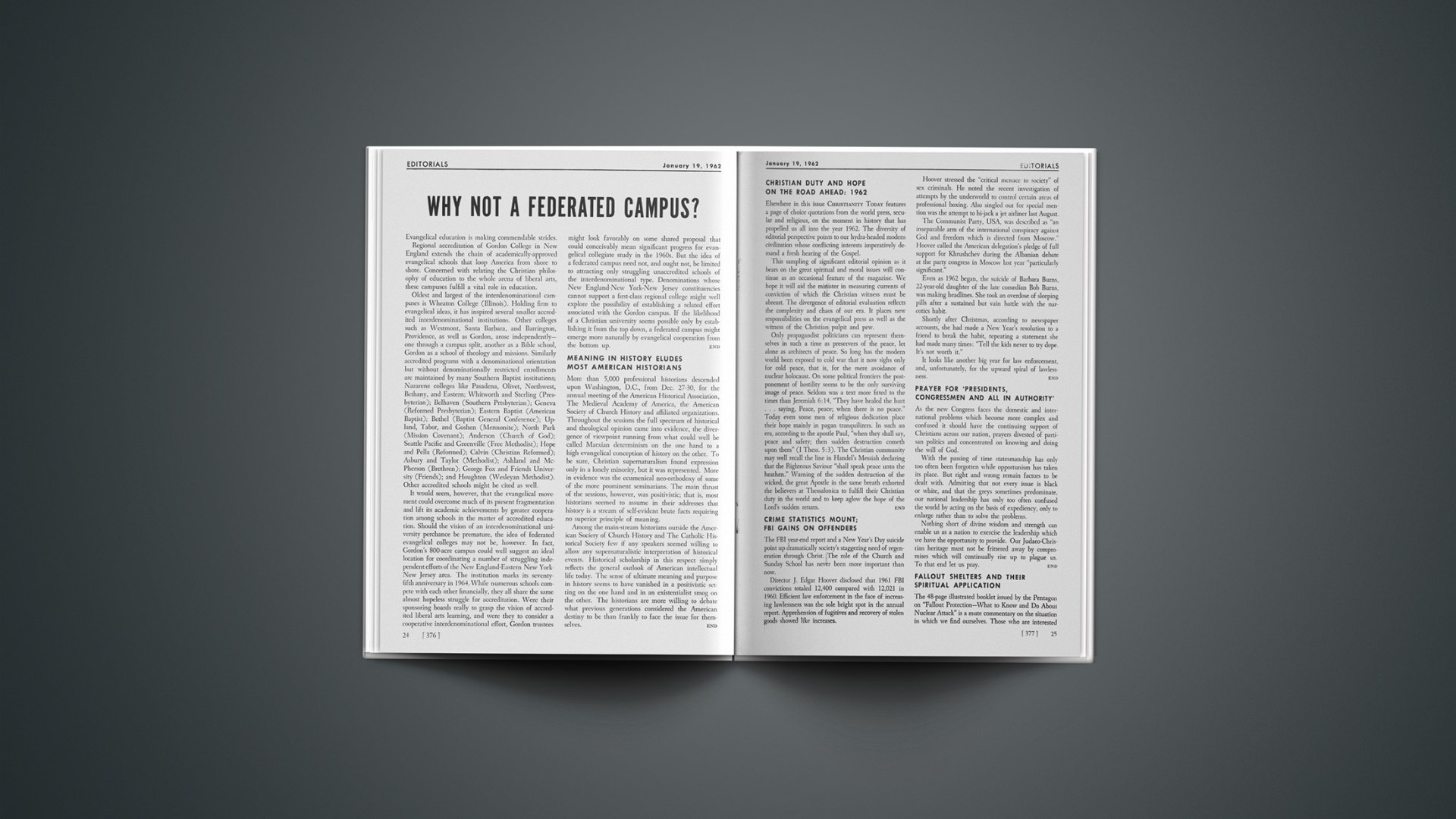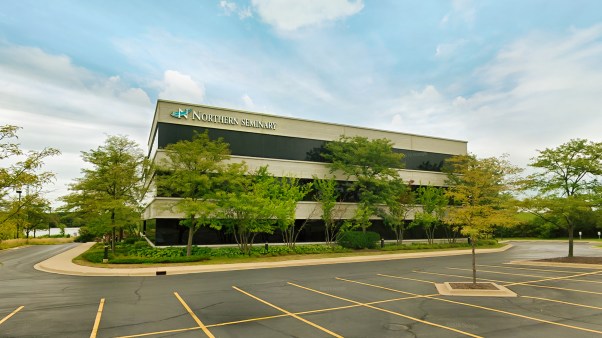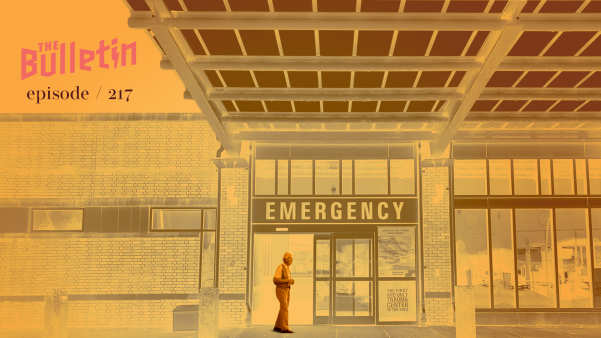Evangelical education is making commendable strides.
Regional accreditation of Gordon College in New England extends the chain of academically-approved evangelical schools that loop America from shore to shore. Concerned with relating the Christian philosophy of education to the whole arena of liberal arts, these campuses fulfill a vital role in education.
Oldest and largest of the interdenominational campuses is Wheaton College (Illinois). Holding firm to evangelical ideas, it has inspired several smaller accredited interdenominational institutions. Other colleges such as Westmont, Santa Barbara, and Barrington, Providence, as well as Gordon, arose independently—one through a campus split, another as a Bible school, Gordon as a school of theology and missions. Similarly accredited programs with a denominational orientation but without denominationally restricted enrollments are maintained by many Southern Baptist institutions; Nazarene colleges like Pasadena, Olivet, Northwest, Bethany, and Eastern; Whitworth and Sterling (Presbyterian); Belhaven (Southern Prtsbyterian); Geneva (Reformed Presbyterian); Eastern Baptist (American Baptist); Bethel (Baptist General Conference); Upland, Tabor, and Goshen (Mennonite); North Park (Mission Covenant); Anderson (Church of God); Seattle Pacific and Greenville (Free Methodist); Hope and Pella (Reformed); Calvin (Christian Reformed); Asbury and Taylor (Methodist); Ashland and McPherson (Brethren); George Fox and Friends University (Friends); and Houghton (Wesleyan Methodist). Other accredited schools might be cited as well.
It would seem, however, that the evangelical movement could overcome much of its present fragmentation and lift its academic achievements by greater cooperation among schools in the matter of accredited education. Should the vision of an interdenominational university perchance be premature, the idea of federated evangelical colleges may not be, however. In fact, Gordon’s 800-acre campus could well suggest an ideal location for coordinating a number of struggling independent efforts of the New England-Eastern New York-New Jersey area. The institution marks its seventy-fifth anniversary in 1964. While numerous schools compete with each other financially, they all share the same almost hopeless struggle for accreditation. Were their sponsoring boards really to grasp the vision of accredited liberal arts learning, and were they to consider a cooperative interdenominational effort, Gordon trustees might look favorably on some shared proposal that could conceivably mean significant progress for evangelical collegiate study in the 1960s. But the idea of a federated campus need not, and ought not, be limited to attracting only struggling unaccredited schools of the interdenominational type. Denominations whose New England-New York-New Jersey constituencies cannot support a first-class regional college might well explore the possibility of establishing a related effort associated with the Gordon campus. If the likelihood of a Christian university seems possible only by establishing it from the top down, a federated campus might emerge more naturally by evangelical cooperation from the bottom up.
Meaning In History Eludes Most American Historians
More than 5,000 professional historians descended upon Washington, D.C., from Dec. 27–30, for the annual meeting of the American Historical Association, The Medieval Academy of America, the American Society of Church History and affiliated organizations. Throughout the sessions the full spectrum of historical and theological opinion came into evidence, the divergence of viewpoint running from what could well be called Marxian determinism on the one hand to a high evangelical conception of history on the other. To be sure, Christian supernaturalism found expression only in a lonely minority, but it was represented. More in evidence was the ecumenical neo-orthodoxy of some of the more prominent seminarians. The main thrust of the sessions, however, was positivistic; that is, most historians seemed to assume in their addresses that history is a stream of self-evident brute facts requiring no superior principle of meaning.
Among the main-stream historians outside the American Society of Church History and The Catholic Historical Society few if any speakers seemed willing to allow any supernaturalistic interpretation of historical events. Historical scholarship in this respect simply reflects the general outlook of American intellectual life today. The sense of ultimate meaning and purpose in history seems to have vanished in a positivistic setting on the one hand and in an existentialist smog on the other. The historians are more willing to debate what previous generations considered the American destiny to be than frankly to face the issue for themselves.
Christian Duty And Hope On The Road Ahead: 1962
Elsewhere in this issue CHRISTIANITY TODAY features a page of choice quotations from the world press, secular and religious, on the moment in history that has propelled us all into the year 1962. The diversity of editorial perspective points to our hydra-headed modern civilization whose conflicting interests imperatively demand a fresh hearing of the Gospel.
This sampling of significant editorial opinion as it bears on the great spiritual and moral issues will continue as an occasional feature of the magazine. We hope it will aid the minister in measuring currents of conviction of which the Christian witness must be abreast. The divergence of editorial evaluation reflects the complexity and chaos of our era. It places new responsibilities on the evangelical press as well as the witness of the Christian pulpit and pew.
Only propagandist politicians can represent themselves in such a time as preservers of the peace, let alone as architects of peace. So long has the modern world been exposed to cold war that it now sighs only for cold peace, that is, for the mere avoidance of nuclear holocaust. On some political frontiers the postponement of hostility seems to be the only surviving image of peace. Seldom was a text more fitted to the times than Jeremiah 6:14, “They have healed the hurt … saying, Peace, peace; when there is no peace.” Today even some men of religious dedication place their hope mainly in pagan tranquilizers. In such an era, according to the apostle Paul, “when they shall say, peace and safety; then sudden destruction cometh upon them” (1 Thess. 5:3). The Christian community may well recall the line in Handel’s Messiah declaring that the Righteous Saviour “shall speak peace unto the heathen.” Warning of the sudden destruction of the wicked, the great Apostle in the same breath exhorted the believers at Thessalonica to fulfill their Christian duty in the world and to keep aglow the hope of the Lord’s sudden return.
Crime Statistics Mount; Fbi Gains On Offenders
The FBI year-end report and a New Year’s Day suicide point up dramatically society’s staggering need of regeneration through Christ. The role of the Church and Sunday School has never been more important than now.
Director J. Edgar Hoover disclosed that 1961 FBI convictions totaled 12,400 compared with 12,021 in 1960. Efficient law enforcement in the face of increasing lawlessness was the sole bright spot in the annual report. Apprehension of fugitives and recovery of stolen goods showed like increases.
Hoover stressed the “critical menace to society” of sex criminals. He noted the recent investigation of attempts by the underworld to control certain areas of professional boxing. Also singled out for special mention was the attempt to hi-jack a jet airliner last August.
The Communist Party, USA, was described as “an inseparable arm of the international conspiracy against God and freedom which is directed from Moscow.” Hoover called the American delegation’s pledge of full support for Khrushchev during the Albanian debate at the party congress in Moscow last year “particularly significant.”
Even as 1962 began, the suicide of Barbara Burns, 22-year-old daughter of the late comedian Bob Bums, was making headlines. She took an overdose of sleeping pills after a sustained but vain battle with the narcotics habit.
Shortly after Christmas, according to newspaper accounts, she had made a New Year’s resolution to a friend to break the habit, repeating a statement she had made many times: “Tell the kids never to try dope. It’s not worth it.”
It looks like another big year for law enforcement, and, unfortunately, for the upward spiral of lawlessness.
Prayer For ‘Presidents, Congressmen And All In Authority’
As the new Congress faces the domestic and international problems which become more complex and confused it should have the continuing support of Christians across our nation, prayers divested of partisan politics and concentrated on knowing and doing the will of God.
With the passing of time statesmanship has only too often been forgotten while opportunism has taken its place. But right and wrong remain factors to be dealt with. Admitting that not every issue is black or white, and that the greys sometimes predominate, our national leadership has only too often confused the world by acting on the basis of expediency, only to enlarge rather than to solve the problems.
Nothing short of divine wisdom and strength can enable us as a nation to exercise the leadership which we have the opportunity to provide. Our Judaeo-Christian heritage must not be frittered away by compromises which will continually rise up to plague us. To that end let us pray.
Fallout Shelters And Their Spiritual Application
The 48-page illustrated booklet issued by the Pentagon on “Fallout Protection—What to Know and Do About Nuclear Attack” is a mute commentary on the situation in which we find ourselves. Those who are interested may secure a free copy at the nearest U. S. post office.
Christians and the Church can well make this the occasion of a spiritual application needed by men everywhere—the universal fact of sin with its fallout of evil and the Divine Shelter to be found in the cleansing, protecting and comforting work of Christ.
Christians should exhibit for all the world to see a serenity and a peace the world does not have—the peace of God in the human heart. They should also exhibit an impelling concern for those who do not possess this peace which “passeth understanding.”
There is deep spiritual significance in poetic expressions to be found in the Bible.… “Keep me as the apple of the eye, hide me under the shadow of thy wings, from the wicked who despoil me, who compass me about,” or, “The eternal God is thy refuge, and underneath are the everlasting arms.”
Citizens should act with prudence but Christian citizens should do more—they should show for all to see that their ultimate trust goes beyond shelters which man may build.
The Role Of The Church In Unrelated Business Activity
Mounting interest in CHRISTIANITY TODAY’S discussion of special tax benefits enjoyed by churches operating unrelated business activities is no surprise. The fact is that no country can long tolerate laws that give churches engaged in commercial ventures special competitive advantages over secular business establishments.
A leading executive recently pinpointed the situation. If he were 30 years younger, he told us, president of a religious foundation, and availed himself of present tax exemptions, he could take over several companies, soon put all competitors out of business, and ultimately control a given industry.
Consider the facts. A good business earns six per cent after taxes. Exempt from such taxes, a church could profit twelve rather than six per cent. Since this higher return offers an attractive loan investment, the sponsoring church can borrow money at lower interest rates. If, for example, it borrows at four per cent to engage in business, the church can realize eight per cent on its investment.
Suppose a church buys a one-million-dollar business that in view of tax exemptions shows an annual profit of $120,000. It can borrow $800,000 to purchase the business at the preferred loan rate of four per cent, or $32,000. Hence, on an investment of $200,000, the church will net $88,000 or 44 per cent.
Suppose, however, the net were only 25 per cent. Even an investment of 25 per cent compounded doubles in less than three years, quadruples in six, in 30 years will multiply itself one thousand times. Starting with a million dollars and encouraged by the present tax exemptions for religious bodies engaging in unrelated business activities, any church by this procedure could own America in 60 years!










